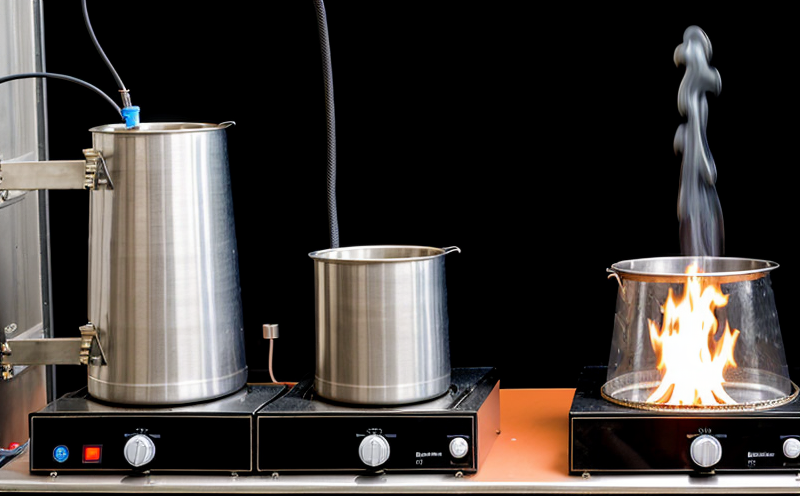Time to Ignition and Heat Release Correlation
The Time to Ignition (TTI) measurement is a critical parameter in fire safety testing, particularly relevant when evaluating the flammability characteristics of materials. This test determines the time it takes for a material sample to ignite under specified environmental conditions, which can be indicative of its resistance to ignition and potential fire risk. Heat release correlation, on the other hand, measures how rapidly heat is released during combustion, providing insight into the intensity of the flame.
These tests are essential in various sectors like aerospace, automotive, textiles, and electronics, where material safety and compliance with regulatory standards are paramount. By understanding both TTI and heat release rates (HRR), engineers can make informed decisions about material selection, design modifications, and process optimization to enhance product safety.
The correlation between TTI and HRR is particularly significant as it helps in predicting the likelihood of a fire starting and spreading within an enclosed space. This relationship underscores the importance of both time-to-ignition characteristics and heat release behavior. The correlation can also be used to assess the effectiveness of flame retardant treatments or other safety measures.
For quality managers, TTI testing ensures that materials meet stringent industry standards for fire resistance, while R&D engineers use these tests to innovate safer products. Compliance officers rely on such data to ensure regulatory compliance and avoid potential liabilities. By integrating these test results into their design processes, procurement teams can source safer raw materials.
The testing procedure typically involves exposing a sample material to a controlled heat source in an environment that simulates real-world conditions. The time it takes for the sample to ignite is measured, followed by monitoring the heat release rate once combustion begins. This dual measurement provides comprehensive data on both ignition characteristics and flame behavior, facilitating more robust product development.
Understanding these parameters is crucial for industries where material safety is not just a preference but a regulatory requirement. For instance, in aerospace applications, materials must resist ignition in high-pressure oxygen environments, while automotive components need to withstand the heat and flames of an engine fire. In textiles, fabrics used in interior furnishings should meet strict flammability standards to prevent potential hazards.
The correlation between TTI and HRR is a key factor in determining not only the safety of materials but also their impact on overall product performance. By aligning these test results with real-world scenarios, manufacturers can optimize their products for both safety and efficiency. This alignment ensures that the materials used are not only flame-resistant but also environmentally friendly and cost-effective.
Benefits
- Enhanced Material Safety: Ensures that materials meet stringent fire safety standards, reducing the risk of fire incidents in various applications.
- Informed Design Decisions: Provides critical data for R&D engineers to design safer products and optimize material properties.
- Regulatory Compliance: Helps compliance officers ensure that all materials used comply with relevant international standards like ISO, ASTM, and EN.
- Risk Management: Identifies potential hazards early in the product development cycle, allowing for timely mitigation strategies.
The ability to correlate TTI and HRR not only enhances material safety but also contributes significantly to risk management practices. By addressing these parameters early in the design process, manufacturers can proactively manage risks associated with fire incidents, ensuring a safer end-product.
Eurolab Advantages
EuroLab provides comprehensive and accurate testing services for Time to Ignition and Heat Release Correlation. Our state-of-the-art facilities are equipped with the latest calorimetric equipment that adheres strictly to international standards, ensuring reliable and consistent test results.
- Accurate Instrumentation: Using high-precision calorimeters, we ensure precise measurement of heat release rates and ignition times.
- Comprehensive Reporting: Our reports provide detailed insights into the material's flammability characteristics, including both TTI and HRR data.
- International Standards Compliance: All our tests are conducted in accordance with internationally recognized standards such as ISO 56601:2018 for TTI testing and ASTM E1354-97(2016) for calorimetry.
- Experienced Staff: Our team of experts ensures that each test is conducted with the highest level of professionalism and accuracy.
EuroLab's commitment to quality and precision makes us a trusted partner in fire safety testing. We pride ourselves on providing reliable data that can be used by clients across various industries, ensuring their products meet the strictest standards for fire safety.
International Acceptance and Recognition
The Time to Ignition (TTI) and Heat Release Correlation tests are internationally recognized as essential tools in assessing material flammability. These tests have been adopted by numerous countries and organizations around the world, including the European Union, North America, and Asia.
- European Standards: TTI testing is part of the EU's stringent fire safety regulations, with ISO 56601:2018 being widely accepted across Europe.
- North American Standards: ASTM E1354-97(2016) is recognized in North America for calorimetry testing, ensuring that results are compatible and comparable globally.
- Asian Compliance: Many Asian countries follow the ISO standard for TTI testing, with some local variations to meet regional requirements.
The acceptance of these tests is not just limited to regulatory bodies but also extends to global markets. Products that pass these tests are recognized as meeting international standards, enhancing their marketability and safety reputation worldwide.
The widespread adoption of TTI and calorimetry testing underscores the importance of these parameters in fire safety. By adhering to these internationally recognized standards, manufacturers can ensure that their products meet the highest levels of safety and quality, contributing to a safer world.





